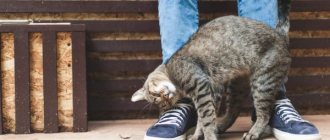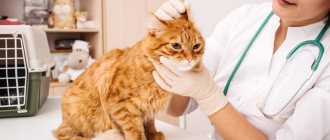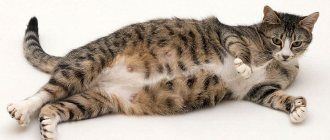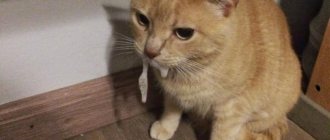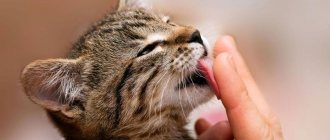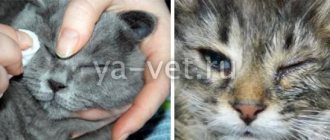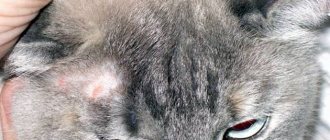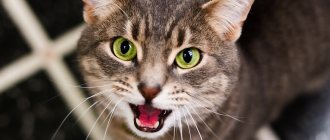Home Questions and Answers Cats Psychology and behavior of cats
A yawn is an involuntary deep breath that occurs when it is necessary to replenish oxygen reserves. In humans, a wide sweet yawn is considered a sign of bad manners, but cats can afford to yawn as much as they want - and they diligently take advantage of this opportunity. For us, yawning is a purely physiological necessity, which manifests itself when there is a lack of oxygen or when there is a drop in pressure. But for cats it is also a way of expressing emotions. Why do cats yawn?
Firstly, this way they demonstrate the position of a strong animal, which is now at peace and in a good-natured mood, but is ready to defend its rights in the event of an attack on them. When cats yawn, they show all their teeth, subtly hinting to others that they can use them at any time. A yawn indicates a cat's confident and satisfied state, but sometimes it can indicate impatience .
Cats yawn and stretch not only before going to bed or after waking up, but also before hunting . This is necessary to stretch your muscles and charge your brain with a portion of oxygen before the jump.
Photos of yawning animals decorate more than one desktop on computers around the world. GIF animation of the cat yawns collects thousands of views. Perhaps every person has seen a cat yawn at least once in his life. At the same time, the animal opens its mouth wide, closes its eyes and freezes for a moment. When the brain lacks oxygen, a person yawns to compensate for the deficiency. What is the basis of yawning in cats?
Cats Yawn: Physiological and Psychological Basis
A yawn in a cat is an uncontrolled breathing process in which a slow, deep inhalation occurs and a rapid exhalation occurs. As a result, the blood is enriched with oxygen and brain function improves. Animal physiology and psychology will help you understand why cats yawn.
© shutterstock
Psychological yawning
A person yawning in a crowded place feels uncomfortable. Cats are the opposite: they yawn demonstratively to show their superiority and dominant position in a given territory. In films about wildlife, you can often see a lion lying in a clearing and yawning sweetly. By this he indicates to others their subordinate status.
In the process of yawning, a cat shows off its teeth and muscles.
Physiological yawning
The physiological basis of the yawning process is related to the need for oxygen to enter the body. So, a cat yawns:
- After waking up from sleep. When a cat sleeps, the whole body rests, processes slow down, including blood flow. Carbon dioxide accumulates. To saturate the brain and organs with oxygen, the cat yawns and stretches. As a result, the body's functioning returns to normal.
- In preparation for physical activity. Cats, like many predators, lie low, wait for prey, and then make a quick dash. The running speed of an animal directly depends on the work of the heart and the quality of oxygen saturation of the brain. Therefore, before making a jump, the animal yawns, feeding on oxygen, so that it can then quickly be used up.
- In the evenings. A cat's yawning in the evening does not mean that she wants to sleep. Cats are nocturnal predators. They sleep during the day and hunt at night. And the yawning of a cat is preparation for night life, for active actions.
Why and how cats purr: we understand the usual “business” for cats
We yawn when we wake up in the morning and fall asleep in the evening. We yawn during boring meetings and during long pauses. We yawn as soon as someone nearby yawns. It would seem that such a habitual reflex, or a ritual. But it’s surprising: researchers are still confused about the reasons for its appearance.
What is yawning?
Yawning is a breathing process that occurs involuntarily with a long, deep inhalation and a relatively quick exhalation. The mouth, as a rule, is wide open and this breathing action is accompanied by a peculiar sound, and for some, tears also appear reflexively.
The process of yawning is in most cases a normal physiological phenomenon that appears when there is a lack of oxygen, stressful situations, overwork, but it can be a sign of certain diseases in the body.
Causes
The most common version is that yawning is a protective mechanism that allows the brain to relieve fatigue by invigorating itself with a fresh dose of oxygen, and at the same time getting rid of excess carbon dioxide.
Statistics and research support this hypothesis: people are most likely to yawn at times when their gray matter is tired and clearly in need of rest - for example, in the evening after a hard day at work, during a boring meeting, or during an overly complex lecture.
A yawn is essentially the same as inhaling, allowing the lungs and blood to become saturated with oxygen. However, as it turned out, people yawn even if they are given pure oxygen for breathing - that is, the reflex opening of the mouth is in no way associated with hypoxia (lack of oxygen). With what then?
Our gray matter works on a similar principle: with prolonged or intense work, its temperature rises, which impairs connections between neurons and ultimately has a destructive effect on thinking.
Therefore, the brain needs cooling - this can be facilitated by an open window or a walk in the park, a glass of cool water, or (since neither the walk nor the glass is shining) a sweet yawn.
In principle, the cooling theory is confirmed by experiments. For example, volunteers who had an ice compress applied to their forehead while watching boring movies yawned 2 times less often than a group of volunteers without a cooling compress. So, if you feel like you're gaping, be sure to note: Your brain is overheated and would benefit from a walk in the fresh air.
This cannot be explained either by oxygen starvation or overheating of the brain, because everyone’s physiological processes occur individually, which means they cannot be simultaneous. This means that the reflex has some other meaning. And he was actually discovered after stumbling upon another fact.
Yawning in people begins not only with visual contact with someone yawning nearby: often, to start the process, you just need to think about yawning, read about it, or hear the specific sound of yawning. It follows from this that a reflex is not always a physiological process, but also a mental one.
After conducting research, scientists came to the conclusion that yawning is contagious due to mirror neurons.
These neurons are responsible for the ability to imitate (for example, when learning foreign languages) and empathize. They force us to consciously experience the emotions of other people, which is actually called empathy.
Roughly speaking: You yawn means you have empathy and are able to function in social groups. It is assumed that our ancient ancestors in this way determined “their own” - those with whom we could play in a team.
By the way, as experiments show, children under 4 years of age and those who suffer from autism are not subject to mirror yawning: they have not yet learned to act according to social laws.
However, interesting facts about yawning are not limited to this.
Interesting Facts
Yawning can be “infected” both from person to person and from person to dog. Research by Swedish scientists proves that dogs can yawn when yawning people come into their field of vision, and the older the dog, the more prone it is to reflexive imitation, and yawning is not transmitted to puppies less than 7 months of age.
If we talk about spontaneous, non-imitative yawning, then different animals have their own reasons for it. The same dogs often “reflect” when they are nervous - for example, when they find themselves in an unusual environment.
While waiting for lunch at the zoo, the lions begin to yawn intensely. Hyenas - when preparing to attack a victim. Many monkeys, by opening their mouths wide, show their superiority in a pack of relatives.
But herbivores yawn much less often than cold-blooded and carnivorous animals. For example, it is extremely rare to see a horse, cow, camel or hare yawning. This, by the way, leads scientists to the idea that yawning may be somehow connected with the level of intellectual development: those creatures whose IQ is higher yawn more often than “silly ones.”
What could frequent yawning be a sign of?
Frequent yawning in itself cannot be a sign of any disease. Its appearance can be triggered by lack of sleep, fatigue, stress, nervousness, overeating, and boredom. In this case, this is a normal reaction of the body to such factors. Once they are removed, yawning will return to normal. By the way, a person yawns at least 10 times during the day.
The presence of other symptoms with frequent yawning may be a sign of illness. For example, with constant drowsiness and frequent yawning, a possible diagnosis is vegetative-vascular dystonia or cardiac arrhythmia.
Dizziness with blurred vision, increased body temperature along with frequent yawning may be a harbinger of an epileptic seizure.
How to overcome yawning?
There are situations when yawning is inappropriate. There are several ways to deal with it:
- When the next yawn approaches, you need to take a deep breath through your mouth and exhale through your nose.
- Many people find that taking a sip of water or wetting their lips with it helps.
- Adequate sleep prevents frequent yawning.
- Exercising will keep the body alert, saturating it with oxygen. You can do squats, push-ups or other physical exercises to tone your body.
- Proper nutrition and drinking the required amount of water throughout the day prevents frequent yawning.
- Don't slouch. Smooth posture contributes to the full filling of the lungs with oxygen. When your back is bent, the diaphragm is not completely saturated with air, which can cause increased yawning.
- Walking in the fresh air, ventilating the room, and quitting smoking will help get rid of causeless yawning.
Natural and forced yawning
Yawning is an involuntary action. The cat does not control the process. She yawns when the body needs to enrich the brain with oxygen.
The reason for yawning is lack of oxygen. You need to understand why your pet is yawning, and whether this is a sign of illness.
Natural causes
There are a number of natural reasons why four-legged animals yawn. These include :
- Yawning after sleep (discussed above).
- Stressful situations. During times of stress, a portion of adrenaline and hormones are released into the blood, putting the body on “combat readiness.” In this case, more energy is expended and oxygen reserves need to be replenished to maintain brain function. The animal yawns. A similar situation can be observed when the cat is, for example, at the veterinarian or in the car.
- Yawning after eating. Food that enters the body begins to be digested, and nutrients enter the blood and are distributed throughout the body, nourishing tissues and organs. To increase the speed of blood flow, the same oxygen is required, and the cat begins to yawn.
- It has been noticed that sometimes a cat yawns while looking at its owner when he yawns. The imitative reflex is triggered when everyone around begins to yawn.
Why does a cat lie on a person and purr? Why or why do cats purr?
We believe that cats make this velvety sound when they experience pleasant emotions... This is true, but only partly.
It turns out that an animal can purr for many reasons, and not only when it feels good. That's what we thought!
A way to calm down
In stressful situations, cats begin to purr.
This happens due to the fact that in childhood, when the mother was nearby, she would certainly purr songs to the kittens and thereby calm the tailed baby. In this way, small, adult and old cats try to calm themselves down in difficult life situations. Have you noticed that these sounds appear at the most inopportune moment? For example, during unloved combing or, in general, at that moment when the cat is angry and bites! It turns out he does this in order to pull himself together. The sounds produced have a calming effect on them.
Advice!
Next time you pet your pet, think about it! Or maybe at this moment he doesn’t like your stroking at all?
But our pets do not always purr when they are in a bad mood. When you come home and the cat greets you with a purr and a joyful “purr”, affectionately rubbing itself and walking with its tail, it means that it is glad to see you. Often, along with purring, cats like to hug and poke their noses in our faces. This is how they show us their love (by the way, sometimes animals can make half-meow, half-murmur sounds). Well, isn't it nice?
Sound therapy
It turns out that the sound of purring is pleasant not only for humans! By using their vibration, kittens are able to recover faster and also help us in this. The low timbre of this sound improves metabolic processes, promotes the healing of wounds and abrasions, and reduces pain. It’s not for nothing that they say that a cat lies down on a sore spot to heal it! So take your furbaby and get some relaxing sound therapy!
Charger
Cats get a lot of rest (which is why it is so important to provide a decent home for them). Of course, they also like to be awake, but they spend more time sleeping. It is believed that “purring” is a kind of exercise to keep their muscles and bones in good shape.
It is believed that “purring” is a kind of exercise to keep their muscles and bones in good shape.
Important! Vibration prevents muscles and joints from atrophying from prolonged inactivity
A way to demand something or an appeal
Also, by purring, cats are able to ask for something or even demand it! A cat may lie down next to you and start purring not at all from pleasure.
Thus, she attracts attention and asks the person for a little affection. Give your pet a little love and the volume of sounds emanating from it will increase significantly
Why does a cat trample and move its paws and purr loudly when you stroke them?
And sometimes they can climb on you and lie on your stomach. So why do they do this? When your furry pet climbs on you, this is the highest point of trust and one of the ways of greeting. But in theory, fingering with their paws should disappear over time, because this is the behavior of kittens in the first place - thus, they “milked” their mother in childhood. Most often, cats are taken away from their mother too early and they do not have time to grow up. Again, this behavior is a demonstration of joy and trust in you.
Forced reasons
Yawning is always a lack of oxygen. The owner should be alerted by the pet's frequent yawning, state of apathy, lethargy. After all, yawning can be a sign of illness :
The consequences of diseases can be very serious, so it is not recommended to independently diagnose your pet and self-medicate.
What happens when a cat yawns?
Yawning in a cat is an uncontrolled respiratory process of the body, consisting of a deep, slow inhalation and a quick, sharp exhalation. The result of the process is the enrichment of blood with oxygen and an increase in the rate of vascular blood exchange in the brain. And this leads to the enrichment of brain cells with nutrients coming from the bloodstream and cleansing them of carbon dioxide and harmful substances. Consciousness becomes clearer, well-being improves, some lightness appears in the body, and stress is relieved.
Yawn to cheer yourself up
If a person yawns, it means he wants to sleep or is bored. Many people believe that the cause of yawning may be due to a lack of oxygen in the room. But it is not so.
Yes, yawning can be associated with fatigue or sleepiness. When a person is emotionally or physically exhausted, their breathing begins to slow down. Inhalations and exhalations become less frequent and shorter, as a result of which, due to an excess of carbon dioxide in the blood, carbonic acid begins to predominate. This is what provokes yawning.
To get the missing dose of oxygen, you need a deep, slow breath. This is why the body begins to yawn. The muscles of the face and neck are actively involved in this process, due to the tension of which the blood flow of blood vessels and brain cells improves.
Many people want to stretch after yawning. This reflexive “charging” in tandem with yawning helps to awaken the body and improves dysfunctional functions.
Scientists have refuted the view that yawning is associated with a lack of oxygen in poorly ventilated areas. Experiments have shown that people yawn with the same frequency both when there is a lack of oxygen and when it is actively entering the body.
How to stop a cat from biting its feet?
- The fact that your cat is after your feet is not due to aggression in most cases. It is simply a form of hunting fun and game that you have become the object of for some reason.
- The legs move and are "at the level" of the cat, which can easily grab them - that's why it attacks them and runs away.
- The cat does not understand that this surprises you - he does not think in these categories, he simply fulfills his need.
- Do you want him to stop attacking your feet and biting your fingers? Then you should let him hunt for other "right" objects - in short, play with him more. You can do it a little, but several times a day - in this way the purring pet will discharge the accumulated energy and satisfy its natural instincts. This will greatly increase the chances that he will leave your legs alone.
- If you have a kitten at home, teach it from the very beginning that your feet and hands should not be bitten. This will pay off in the future - cats who were not allowed to play biting when they were young are less likely to "attack" their owners as adults.
- If your purr is the only cat in the house, then adding another furry friend might also be a good idea. Two cats usually play and hunt with each other - which, of course, does not mean that you can spend less time with them. In any case, there is no escape from a cat fishing rod or a plush mouse.
When a cat yawns: what are the reasons for this phenomenon?
1) After sleep. When a cat sleeps, brain activity slows down. Blood flow slows down, brain activity slows down, and carbon dioxide accumulates in the blood. Accordingly, upon waking up, it is necessary to establish brain activity, so nature provided for yawning - a quick enrichment of the bloodstream with oxygen.
2) During times of stress. Stress leads to the release of harmful substances into the blood, which leads to a decrease in brain activity. Accordingly, to remove these substances, it is necessary to yawn tightly and, so to speak, relieve tension. You can observe a picture when a pet yawns due to stress, for example, in a veterinary clinic, when the four-legged dog is waiting in line with the owner to see a specialist.
3) After eating. To break down foods, part of the energy in the bloodstream is sent not to the brain, but to the digestive system, in order to ensure the breakdown of recently eaten food. The number of yawns at this moment increases in order to maintain brain activity at the desired level. It is worth noting that heavier cat foods that are poorly digestible cause more frequent yawning than easily digestible ones.
4) As a consequence of overwork. After a long trip somewhere in a carrier, your pet may simply get tired. Brain activity will be reduced. To restore it, the cat yawns reflexively.
5) Due to some neuralgic disease. If blood flow is disrupted and harmful elements are removed from the animal’s body, in particular the brain, the pet may yawn regularly. And if other symptoms or behavioral characteristics are observed, you can safely go to the veterinarian and look for the cause of the disease.
What can I do to prevent this in the future?
If you are on a personal connection, like at home, you can run an anti-virus scan on your device to make sure it is not infected with malware.
If you are at an office or shared network, you can ask the network administrator to run a scan across the network looking for misconfigured or infected devices.
Another way to prevent getting this page in the future is to use Privacy Pass. You may need to download version 2.0 now from the Chrome Web Store.
Cloudflare Ray ID: 569a5b6edc8bc79d • Your IP: 5.45.65.94 • Performance & security by Cloudflare
As a Norwegian it makes me sad to see all these abandoned farms in Norway because I guess that's what this article is about.
One small note here is that all the pictures shown are about 20 photos of the same house, but from different angles and uncontrolled feeds. In addition, there are buildings presented here that were not intended for habitation at any time, but as barns or outbuildings, as we say, and often with a private workshop included in the outbuildings.
There are also images of what we call main houses or manors, large farms in which many of the countrymen participate as "housewives" - there are simply no such abandoned large estates in Norway. Therefore, the photographs must be taken from another country.
Some of the drawings show a boathouse (boat house) and are presented as an abandoned house. Secondly, there are photographs of houses that do not belong to any Norwegian building customs or structures and which obviously came from other countries.
Controlling brain overheating
According to American researchers, yawning plays a critical role in regulating brain temperature. Like a computer, our brain can “overheat and fail” after prolonged activity. By yawning, we open up access to cooler air and new blood flow. As a result, our brain “reboots” and functional activity is restored.
Surprisingly, yawning prompts decisive action. During tense situations, our body seems to freeze, and breathing spontaneously stops for a while. And this is where yawning comes to the rescue. Saturating brain cells with oxygen improves readiness for responsible decisions.
The child yawns often - why?
The baby begins to yawn while still in the mother's womb at about the eleventh or twelfth week of pregnancy. Why do children yawn? One recent American study confirmed that yawning is evidence of the successful and correct development of a baby's lungs. However, at each age, the tasks of yawning are different, and if a yawn often helps adults to cheer up, then a baby, with the help of a yawn, regulates the temperature of the brain, calms down and falls asleep.
But if a child yawns too often and not when it is time for him to rest, it would be a good idea to consult a doctor, since yawning may indicate a lack of oxygen or nervous tension. In the second case, you will need to consult a neurologist, and if the problem is a lack of oxygen, then you will have to reconsider the baby’s regimen in the direction of increasing the duration and frequency of walks in the fresh air.
Yawn, go to Fedot
2) Provide physical activity, namely, play more. The latter is easy to do if you use special toys for cats that allow you to use all muscle groups in the body of the mustachioed tabby.
If a person starts yawning after everyone else, it's not just a coincidence. About 60% of people yawn even when they read or hear about yawning or watch pictures of yawning characters.
This is all due to the special mirror neuron reactions that occur in our brain during the perception of reality. Without noticing it ourselves, we copy the movements, manner of speaking, and even the yawning of other people.
Animals, especially dogs, very often yawn after their owner.
How to get rid of yawning, recommendations
To stop your pet from yawning you need to:
1) Allow the animal to get enough sleep, that is, organize a daily routine.
2) Provide physical activity, namely, play more. The latter is easily achievable if you use special toys for cats , which allow you to use all muscle groups in the body of the mustachioed tabby.
3 Balance your diet. Food should be easily digestible
4) Try to reduce the number of stressful situations. If such problems occur, use special herbal preparations to relieve tension, fear, stress, allowing the four-legged animal to relax.
5) Be regularly examined by a veterinary specialist; in case of illness, carry out treatment measures in a timely manner.

